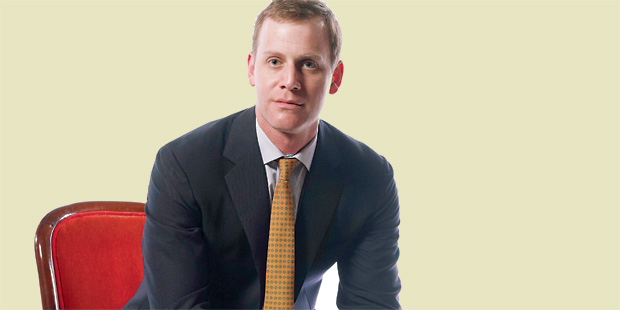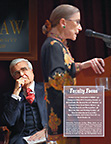Introducing Daryl Levinson
David Boies Professor of Law
Printer Friendly VersionWhen asked recently for his résumé, Daryl Levinson realized he didn’t have one. In 15 years of teaching at three law schools, employers have always pursued him. It’s hard to imagine a piece of paper conveying everything that he has going for him anyway. Colleagues rank him among the most original thinkers of constitutional law and theory in the academy. His generosity in mentoring junior faculty is legendary. He’s so popular with students that at Harvard Law School, where he had been on the faculty since 2005, the class of 2008 honored him with the Sacks-Freund Teaching Award. In short, says his former Harvard colleague Michael Klarman, “He is the Michael Jordan of the legal academy.”
Yet try to pay Levinson a compliment and he’ll vigorously try to convince you that you are mistaken. “I don’t really do anything important,” he says. “Many of my colleagues are real lawyers, involved in high-stakes litigation or helping to run the country. Others are writing scholarship that helps solve real-world problems. I just sit around reading and thinking about idiosyncratic ideas that hardly anyone else cares about, and occasionally I write articles that hardly anyone reads. Then I teach that stuff to the students.” Levinson avoids the spotlight so strenuously that he attempted to quash this very magazine profile. But colleagues have developed work-arounds. “When you try to say something nice to his face,” Harvard Law professor Gabriella Blum says, “he turns his head sideways, rolls up his eyes, and waves his hand dismissively.” She now e-mails her thank-yous.
Levinson, 41, who taught at NYU Law from 2002 to 2005, rejoins the faculty as the first David Boies Professor of Law, after spending last year as an inaugural fellow of the Straus Institute for the Advanced Study of Law & Justice here. “Daryl is beloved for his commitment to academic values, brilliant mind, helping colleagues push their work to the highest level, spectacular teaching, and for the way he combines personal warmth with darkly cynical wit and humor,” says Richard Pildes, Sudler Family Professor of Constitutional Law.
This year, Levinson will teach Constitutional Law and Remedies, subjects that he has taught many times. Yet he will still prepare eight to 12 hours for every in-class hour. Over-preparing is the only way to keep his stage fright under control, says Levinson. But the effort pays off. “You don’t go to his class to hear a stale lesson,” says former student John Rappaport. “Watching him present a case, break it down and turn it inside out, is like watching someone do a magic trick.”
Levinson approaches prevailing ideas with the same skepticism he uses to judge himself. “Daryl specializes in popping ideas—taking apart the conventional wisdom with devastating results,” says Yale law professor Heather Gerken. One example is “Separation of Parties, Not Powers,” which he co-authored with Pildes and published in the Harvard Law Review in 2006. Much of constitutional law and scholarship rests on the assumption that Congress and the Executive Branch are cast in competing roles that check and balance each other; this article points out that the lines of conflict in politics correlate much more strongly with political parties than with branches of government.
Another distinctive feature of Levinson’s work is that it often develops ideas that range across conventional legal categories—and beyond. In “Collective Sanctions” (Stanford Law Review, 2003), Levinson examines topics ranging from blood feuds in primitive societies to microcredit lending in developing countries to determine when it makes sense to punish a group for the misdeeds of individual members. Similarly, a piece in progress called “Rights and Votes” explores choices for protecting minorities by drawing from at least a dozen legal and political contexts. “He’s remarkably synthetic in his work,” says David Golove, Hiller Family Foundation Professor of Law.
Levinson’s work is also acclaimed for bridging major scholarly divides. In articles such as “Empire-Building Government in Constitutional Law” (Harvard Law Review, 2005) and “Rights Essentialism and Remedial Equilibration” (Columbia Law Review, 1999), Levinson applies insights from the economic analysis of corporations and the common law to constitutional law. “By applying the intellectual toolkit of privatelaw scholarship to questions of public law, Levinson has opened entirely new ways of looking at familiar questions,” says John Jeffries Jr., former dean of the University of Virginia School of Law. His recent work with former Harvard colleague Jack Goldsmith on the parallels between constitutional and international law, including the article “Law for States” (Harvard Law Review, 2009), blurs another traditional boundary and creates new possibilities for collaboration and cross-pollination.
Levinson regards his own life with droll detachment. He grew up in Atlanta, where he attended public school. He remembers excelling in eighth grade physics taught by Coach Sport. “Sport—his real name—was hired to coach football, then was relegated to do classroom teaching,” he says. To illustrate the workings of electricity, Sport stripped the wires from a hand-cranked generator and would command students, two at a time, to grab an end. “He would start cranking the generator, and your arm would burn and shake. Whoever held on the longest would get an A,” he says. The students also learned about wind resistance from the wooden paddle that Sport used to maintain discipline.
Levinson credits Coach Sport for his intellectual curiosity. “My friends and I realized that if we wanted to learn anything beyond football and corporal punishment we would have to figure it out for ourselves.”
Harvard University was a culture shock for Levinson. As his ambitions drifted from playing guitar in a punk band to opening a burrito stand, his classmates were “already years into strategizing their ascent to the Supreme Court or Goldman Sachs.” In time, however, he came to appreciate the advantages of not being relentlessly groomed for success. “I saw a lot of people climbing ladders without much thought about why they wanted to get to the top.”
Levinson’s defining intellectual experience at Harvard came when he stumbled upon Richard Rorty’s Philosophy and the Mirror of Nature. “His work showed me for the first time that scholarship could be as profound and sublime as a Nabokov or Faulkner novel.” Earning his B.A. in 1990, Levinson took time off to travel before entering the University of Virginia to study with Rorty himself, and to study law. Graduating in 1995 with a J.D. and, as he describes it, “a hodgepodge of graduate work in philosophy and English,” Levinson, then 26, accepted Virginia’s offer to teach in the law school the following year. “I never set out to become a law professor, I didn’t have the foresight to realize how great a job it would be for me,” he says.
Levinson returns to New York with his wife, Wendy, 40, who plans to restart her publishing career here, their sons Henry, 5, and Oliver, 2, and the family’s labrador retriever, Esther. Teaching at Harvard was “a once in a lifetime opportunity” says Levinson, but he missed NYU Law, he confesses. “The array of interesting people from every discipline, who are either on the faculty or are passing through giving a workshop, doing a colloquium or teaching a course, is really amazing. There’s an intellectual and cultural vibrancy, an openness to new ideas, and a relentlessly forward-looking perspective that makes NYU—and New York City—different from anywhere else in the world.”
—
All of 2010 Faculty Focus


 Multimedia
Multimedia